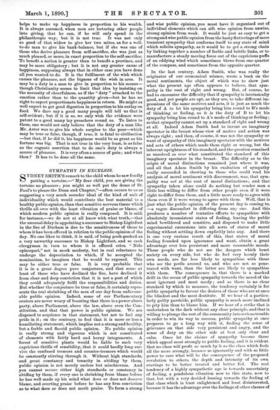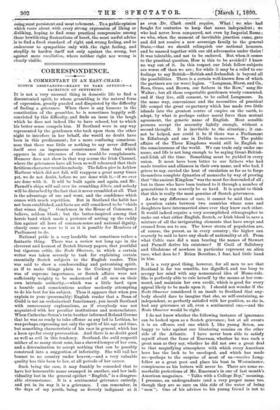SYMPATHY IN EXCELSIS.
YDNEY SMITH'S remark to the child whom he saw fondly
patting a tortoise,—" My dear child, you are giving the tortoise no pleasure ; you might as well pat the dome of St. Paul's to please the Dean and Chapter,"—often occurs to us as suggesting a very much sounder ideal of the kind of unit of individuality which would contribute the best material to a healthy public opinion, than that sensitive nervous tissue which thrills all over with the least vibration of praise or blame, of which modern public opinion is really composed. It is said, for instance,—we do not at all know with what truth,—that the unusual delay in appointing a successor to Bishop Lightfoot in the See of Durham is due to the sensitiveness of those to whom it has been offered in relation to the public opinion of the day. No one likes to think, it is said, of being pooh-poohed as a very unworthy successor to Bishop Lightfoot, and so each 'clergyman in turn to whom it is offered cries, "Nob episcopari," not in mock modesty, but in real reluctance to undergo the depreciation to which, if he accepted the nomination, he imagines that he would be exposed. This may be either true or false. It is very probable that It is in a great degree pure conjecture, and that some at least of those who have declined the See,, have declined it from clear and deep conviction that it is not a post of which they could adequately fulfil the responsibilities and duties. But whether the conjecture be true or false, it certainly repre- sents the real shrinking of the men of our day from unfavour- -able public opinion. Indeed, some of our Parliamentary orators are never weary of boasting that there is a power above party, above Parliament, above the law, above even the Con- stitution, and that that power is public opinion. We are disposed to acquiesce in that statement, but not to feel any pride in it ; on the contrary, to feel that it is more or less a humiliating statement, which implies not a strong and healthy, but a feeble and flaccid public opinion. No public opinion is really strong and vigorous which is not constituted of elements with fairly hard and horny integuments. A 'forest of sensitive plants would be liable to such very capricious thrills of sensibility, that it could hardly long sur- vive the confused tremors and counter-tremors which would ■ he 'constantly stirring through it. Without high standards, and great constancy and tenacity in abiding by them, public opinion is not merely useless but mischievous. And you 'earmst secure either high standards or constancy in abiding by them, if every one is shrinking from blame before he has well made up his mind what does or does not deserve blame, and courting praise before he has any firm conviction AS to what does or does not merit praise. To form a strong and wise public opinion, you must have it organised out of individual elements which can sift wise opinion from unwise, strong opinion from weak. It would be just as easy to get a strong and wise public opinion from the hasty flat terings of mere transient sympathy that conforms itself to any state of mind which solicits sympathy, as it would be to get a strong chain by linking together a number of feeble and brittle links, or to manufacture a steady moving force out of the capricious puffs of an eddying wind which sometimes blows from one quarter of the compass, and sometimes from the opposite quarter.
In the last century, Adam Smith, who was really the originator of our economical science, wrote a book on the moral sentiments, the object of which was to show just what the present age often appears to believe, that sym- pathy is the root of right and wrong. But, of course, he had to encounter the difficulty that if sympathy is intrinsically good, and yet people are apt, as they are, to take different im- pressions of the same motives and acts, it is just as much the duty of A to let his sympathy bring him round to B's mode of thinking or feeling, as it is the duty of B to let his sympathy bring him round to A's mode of thinking or feeling ; so that sympathy cannot set up a standard of right and wrong at all. Indeed Adam Smith had to invent an imaginary spectator in the breast whose view of motive and action was always right ; and then, of course, it was not the sympathy or want of sympathy of this imaginary spectator with the motives and acts of others which made them right or wrong, but the inherent uprightness of his standard, and the question remained as unsolved as ever what constituted the standard of this imaginary spectator in the breast. The difficulty as to the origin of moral distinctions remained just where it was, and all that Adam Smith by his exaltation of sympathy really succeeded in showing to those who could read his analysis of moral sentiment with discernment, was, that sym- pathy was not at the root of moral distinctions ; and that sympathy taken alone could do nothing but render men a little less willing to differ from other people even if it were right to differ from them, and a little more ready to agree with them even if it were wrong to agree with them. Well, that is just what the public opinion of the present day is coming to, —a vague discomfort in differing from any one. And this produces a number of tentative efforts to sympathise with absolutely inconsistent states of feeling, leaving the public mind bewildered and sensitive, and disposed to make little experimental excursions into all sorts of states of moral feeling without settling down explicitly into any. And there is one very curious result of this, that states of moral feeling founded upon ignorance and want, obtain a great advantage over less persistent and more reasonable moods. Those people who do not see the dangers which beset society on every side, but who do feel very keenly their own needs, are far less likely to sympathise with those who see the perils around us, and who are not so pene- trated with want, than the latter are likely to sympathise with them. The consequence is, that there is a marked drift in the ocean of public sympathy towards the mood of the most ignorant and most needy ; and as there is no clear standard by which to measure, the tendency certainly is for public sympathy to favour the desires of those who are at once the blindest and the most destitute. If we hear of a particu- larly guilty parricide, public sympathy is much more inclined to pity him than to blame him. If we hear of a strike that is undertaken in the dark without any clear principle, and that is willing to plunge the rest of the community into serious trouble in order to win its way to success, public sympathy at once prepares to go a long way with it, finding the sense of grievance on that side very persistent and angry, and the sense of duty on the other side at best only clear and calm. Once let the claims of sympathy become those which appeal most strongly to public feeling, and it is evident that no class will profit so much by it as the class which feels all the more strongly, because so ignorantly and with so little power to care what will be the consequence of the proposed revolution to others, the depth and intensity of its own cravings to be better treated and better fed. The real tendency of a highly sympathetic age is towards uncertainty of feeling, a pendulous vibration now to this state, now to that, but with a very decided leaning towards the feeling of that class which is least enlightened and least disinterested, because it has the advantage over the feelings of other classes of not PaMistent an4 in0qtyehement. To a pnblic opinion which veers about with every strong expression of liking or hoping_to,find some practical compromise among -,these bewildering Auctnations of heart, the most useful advice is to fin& .a, Axed standard: of right aid wrong feeling, and to endeavour to sympathise only with :the right ,feeling, and ateadily: to harden- itself not. .only against the wrong, but -against mere vacillation, where neither right nor wrong is clearly visible.







































 Previous page
Previous page